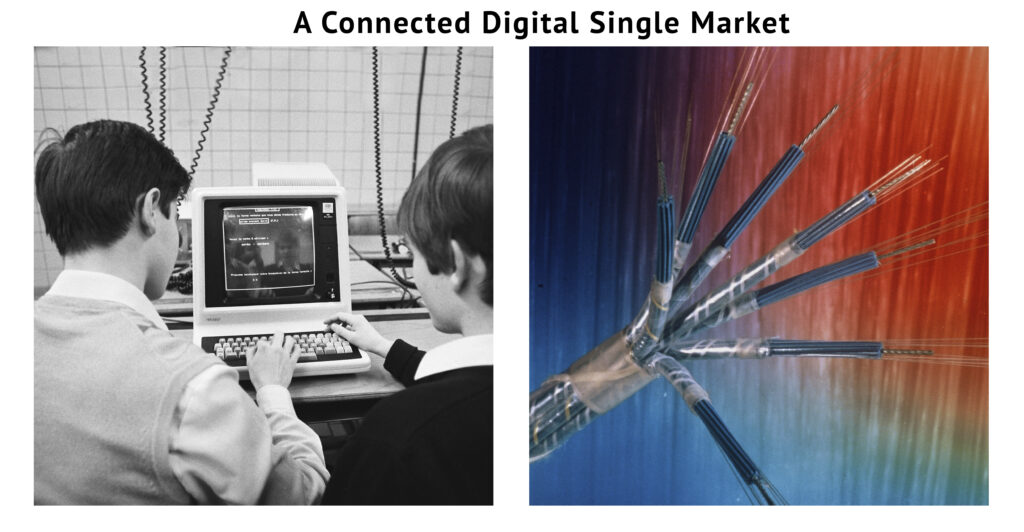By Wenka Weber

“We want Europe to be one of the leading AI continents, and this means embracing a way of life where AI is everywhere.” With this statement, Ursula von der Leyen has made a forward-looking decision for the development of AI in Europe. At the summit in Paris, where numerous heads of state and government met to discuss and advise on future progress, she reinforced the urgency of greater investment and independent innovation to ensure Europe remains competitive on the global stage.
Artificial intelligence is becoming increasingly important, not only in politics but also across society. Max Reddel, from the ‘Centre for Future Generations’, told AEJ Belgium, “Not a lot of people in Brussels, but also beyond realize that AI is really important, maybe the most important technology”. While it may be easy to anticipate its impact, Reddel emphasizes that AI extends far beyond chat bots. He explains that AI technologies will have a profound societal effect, particularly through general-purpose AI, which can be applied to a wide range of different tasks. As Advanced AI Director at the ‘Centre for Future Generations’, Reddel is also focused on developments at EU level, such as the introduction of the ‘Cern for AI’, an European initiative presented by Ursula von der Leyen.
Now, more than ever, focusing on being competitive is crucial for Europe’s AI sector. Reddel refers to Mario Draghi, who warns in his 2024 report that “Europe could potentially end up in a technology trap if it continues to rely on foreign companies to provide these technologies”. This dependence is particularly problematic.
To counteract this, Reddel continued, “It is important to focus on financing the development of our own systems, also so that Europe does not lose a big bargaining chip”. He emphasized that while investments are a crucial start, continued progress on both practical and scientific level remains essential.
For developing practical AI technologies and strengthening Europe as a sustainable location for AI, the strategies of CERN for AI, emphasizing a partnership between the private and public sector is particularly important.“It is the largest public investment for AI in the world, which will unlock over ten times more private investment”, as von der Leyen explained in Paris.
Reddel emphasizes the relevance of balancing public supervision with the speed and technical expertise of the private sector. He adds: “When private money is involved, it’s difficult to simply hope that things will go well, but if we are aiming for the public good, the public sector needs to be much more involved to ensure that we have trustworthy AI systems”.
According to Reddel, the spirit of CERN revolves around uniting research to tackle major challenges. “We need research to create trustworthiness. Understanding and researching trustworthy and ethical AI systems matters because all applications and adoption of it are downstream from there,” as Reddel elaborates.
Connecting research with practical applications is essential for progress. “We are looking at different types of elements of a CERN for AI. For example, gigafactories, which are huge data centers hosted by a country,” explains Reddel. These large data and computing infrastructures are designed to train very large systems. Modeled after the CERN in Geneva, this initiative brings together researchers, entrepreneurs and investors to develop technologies. “We are creating a safe space for them (…). Because AI needs competition, but also cooperation”, as von der Leyen explains the new approach.
The AI law will take effect in August 2024 and is expected to become fully applicable two years later, in 2026. Nevertheless, there is an urgent need for quick implementation to increase competitiveness, as Max Reddel told AEJ Belgium: “The most important thing is not only to develop AI, but also to use it: In Europe, we have a lot of data. We lack the infrastructure and data centers to use it, so the move to focus on creating new data centers is crucial. For the EU, this means that the different member states need to work together to achieve quick wins.”
He added: “I think there are ways. If there is a political will, there is a political way to do it. I am hopeful in the sense that I don’t think it will happen by itself, but if we all really make a big effort, then we can be hopeful that it will happen quickly enough.”
Max Reddel describes to AEJ Belgium that such a development would be highly beneficial, bringing many advantages for society. For instance, public services could be enhanced by improving efficiency in simple tasks, or in healthcare, where AI contributes to revolutionary breakthroughs, particularly significant for drug discoveries and cancer research. He also points out that AI could play a crucial role in creating technologies to address the climate crisis. As he sums it up: “If it is done well it could make things much easier on a lot of different levels for society. But of course, it needs to be done carefully.”
Artificial intelligence technologies could also bring far-reaching changes to journalism. It is not only the potential for automating tasks like transcribing or analyzing data that is being discussed. AI could also play a key role when it comes to collecting information or producing and distributing news. However, these processes are not without their criticisms. As AI continues to evolve, it remains crucial to stay aware of and address its negative aspects, such as misinformation and the misuse of these technologies.
